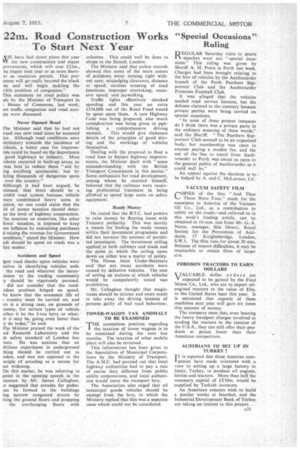22m. Road Construction Works To Start Next Year
Page 33

If you've noticed an error in this article please click here to report it so we can fix it.
VE have laid down plans this year VV for new construction and major provements, which will cost f22m., be begun next year or as soon thereer as resources permit. This proimme will go really beyond the black 3ts and will begin tackling the rible problem of congestion."
This statement on road policy was ide by the Minister of Transport in House of Commons, last week, ten traffic congestion and road acciots were discussed.
Never Opened Road
The Minister said that he had not • ened one new road since he assumed ice. Although road conditions were ntributory towards the• incidence of :idents, a better case for improvemts could be based on the importance good highways to industry. Most :idents occurred in built-up areas, so was best to reduce them "not by ing anything spectacular, but by :kling thousands of dangerous spots over the country."
Although it had been argued, he ntinued, that there should be a endid road system because, vehicle friers contributed heavy sums in cation, no one could claim that the :Id of motor taxation should deterne the level of highway construction. he taxation on motorists, like other lireet taxation, is imposed to keep wn inflation by restraining purchases d raising the revenue for Government penditure," stated the Minister. How ich should be spent on roads was a bey matter.
Accidents and Speed ;pot road checks upon vehicles were ective in identifying vehieles unfit • the road and whatever the inconlience to the trading community :y should be vigorously pursued.
did not consider that the road:ident problem hinged on speed. Ve know that the economic life of country must be carried on, and ire is a strong case, on grounds of )norny, for certain types of vehicle ether it be the 3-ton lorry or what' .0 it may be, going even faster than :y do today," he said.
The Minister praised the work of the ad Research Laboratory and the safety standard of London bus vers. He was anxious that an ibitious experiment in underground rking should be carried out in ndon, and was not opposed to the nciple of arcading as a means for eet widening.
On this matter, he was referring to point in the openingspeech in the cussion by Mr. James Callaghan, LO suggested that arcades for pedesails be formed in the buildings ing narrow congested streets by tting the ground floors and propping the overhanging floors with columns. This could well be done to shops in the Strand, London.
The Minister said that police records showed that some of the main causes of accidents were: turning right without care; misjudging clearance, distance or . speed; careless crossing of road junctions; improper overtaking; excessive speed; and. jaywalking.
Traffic lights effectively checked speeding and this year an extra £334,000 out of the Road Fund would be spent upon them. A new Highway Code was being prepared, also much• consideration was being given to pybfishing a comprehensive driving
manual. This would give elaborate details of the principles of good driving and the workings of vehicles themselves.
Dealing with the proposal to float a road loan to finance highway improvements, the Minister dealt with "some misunderstanding with the British Transport Commission in this matter." Some enthusiasts for road development, among whom he counted , himself, believed that the railways were receiving preferential treatment in being allowed to spend large sums on safety equipment.
Ready Money He stated that the B.T.C. had powers to raise money by floating loans with Treasury authority. This was merely a means for finding the ready money within their investment programme and did not increase the amount of permitted investment. The investment ceiling applied to both railways and roads and the point at which the ceiling came down on either was a matter of policy.
The Home Joint Under-Secretary said that not, many accidents were caused by defective vehicles. The cost of setting up stations at which vehicles would be compulsorily tested was prohibitive.
Mr. Callaghan thought that magistrates should be stricter and more ready to take away the driving licences of persons guilty of bad road behaviour.
























































































